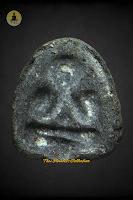Phra Pidta Lang Beab Run Rae (1st Batch) Nur Phong BE2500 Chao Khun Sri (CK Sri) Wat Ang Sila, Chonburi with G-Pra Certificate
1. General Overview
-
Name: Phra Pidta Lang Beab Run Rae (First Edition)
-
Material: Nur Phong (sacred powder blend)
-
Year of Creation: B.E. 2500 (1957)
-
Temple: Wat Ang Sila, Chonburi Province
-
Maker: Chao Khun Sri (Phra Wisut Samajarn, Sri Brahmachoti Thera)
-
Certification: Issued with a G‑Pra Certificate, confirming authenticity
2. Purpose of Creation
-
Designed as a meditative and protective amulet featuring the Pidta posture (“closing the eyes”) for seclusion, merit-sealing, and warding off misfortune and malevolent spirits.
-
Served as part of a sacred batch produced under Chao Khun Sri’s spiritual guidance to support temple restoration and community merit-making projects.
3. Materials and Composition
-
Made from Nur Phong, a mixture of:
-
Pulverized ancient amulet remnants and old temple powders
-
Incense ash, flower pollen, and Ubosot soil from Wat Ang Sila
-
Additional quality control herbs and minerals gathered by Chao Khun Sri
-
-
Pressed into the “Lang Beab Run Rae” mold, depicting a seated Pidta figure with a unique encapsulated form and hand-rubbed texture
4. Design Features
-
Front: Classic Pidta image—hands covering the face—symbolizing retreating from the senses for internal clarity
-
Back: Features a powerful Run Rae design, possibly including sacred yantra aligning with spiritual empowerment
-
Characteristic artisanal finish indicates meticulous pressing and partial smoothing to highlight the Pidta figure
5. Consecration Ceremony
-
The batch underwent a Grand Buddha Abhiseka (consecration) led by Chao Khun Sri himself
-
Attended by senior monks from Wat Ang Sila and surrounding temples known for their spiritual influence
-
Included multiple days of chanting, yantra drawing, relic relic inclusion, and meditative empowerment rituals
-
Resulted in issuance of each item with a G‑Pra Certificate, signifying authenticity and blessing lineage
6. Certification and Distribution
-
Each authentic amulet was accompanied by a G‑Pra certificate, providing verification of temple origin, materials used, date of blessing, and maker’s credentials
-
Distributed to devotees contributing to temple upkeep and during local temple festivals
7. Spiritual Significance and Activity
-
Trusted for:
-
Samadhi (deep meditation) and spiritual focus
-
Protection from greed, temptation, and negative forces
-
Merit via temple support and spiritual conduct
-
-
Devotees report heightened serenity, mental strength, and resilience
8. Legacy and Collector Value
-
Among the most respected mid-century artefacts from Wat Ang Sila, due to direct creation by Chao Khun Sri
-
The first batch with G‑Pra certification gives it both spiritual credibility and notable collector appeal
-
Preserved examples are still retained by devotees, collectors, and occasionally appear in serious Buddhist amulet marketplaces

%20Nur%20Phong%20BE2500%20%20Chao%20Khun%20Sri%20(CK%20Sri)%20Wat%20Ang%20Sila,%20Chonburi%20with%20G-Pra%20Certificate%2002.png)





.png)



.png)
%20Wat%20Rakang.png)

%20Wat%20Thepsirin%20Issued%20to%20Wat%20Sin%20Khan.png)
